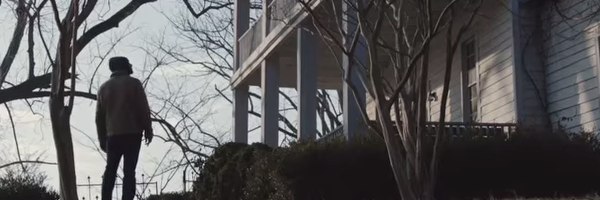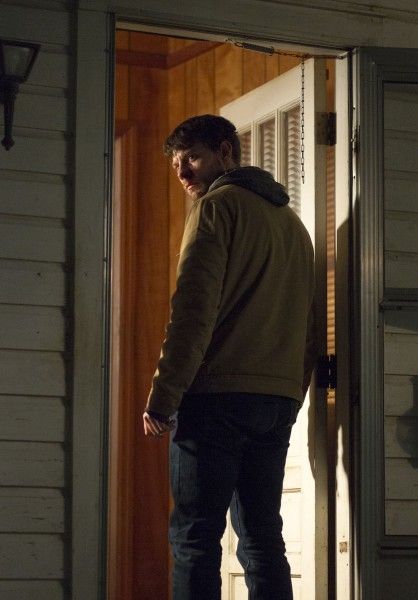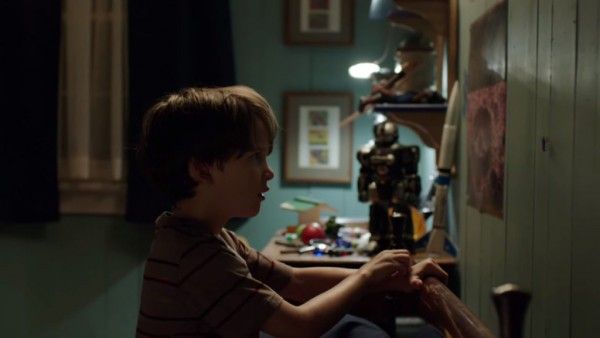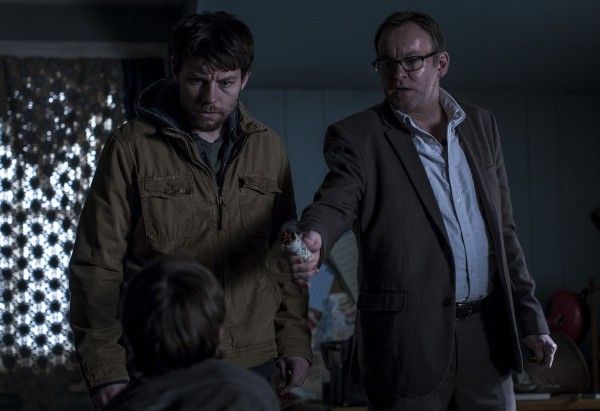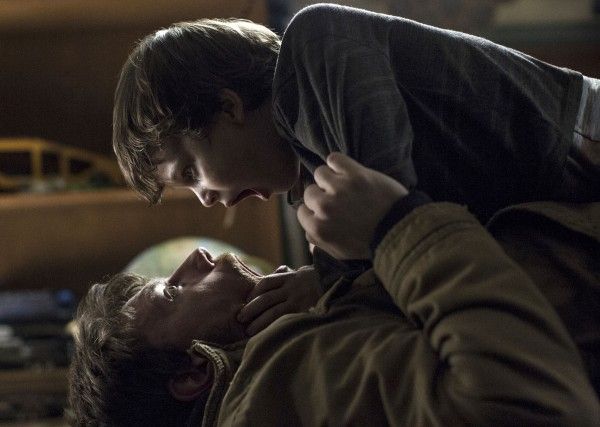I didn't grow up in a town like Rome, West Virginia, the setting of Cinemax's exquisite new horror series Outcast, but I had friends, even very close ones, who did. They would get stopped in supper markets to be interrogated in the friendliest of ways about their family, their girlfriends, or even their schooling. Their neighbors didn't just bring over food in times of crisis or when someone new was moving in, but whenever the inclination hit. I remember a particular sleep-over at a good friend's house where a marathon of Arnold Schwarzenegger movies was interrupted by the friendly woman across the street dropped off meatloaf while giving her dog the last walk of the night. To me, it was completely alien, but there was an unmistakable comfort and reliance to how this kind of communal thinking worked in such a small town.
I bring this up because the small-town politics and societal behavior are crucial to what makes Outcast so immediately engaging. Everyone seems to know everyone else's business, especially when it comes to Patrick Fugit's Kyle Barnes, the survivor of an untold amount of abuse at the hands of his mother, who was possessed by a demon of sorts. The series' writers consistently evoke a wide spectrum of reactions to Kyle's history of abuse, from unerring forgiveness and empathy to disdain, mistrust, and horror. Not unlike Netflix's sensational Jessica Jones, Outcast is a tale of a survivor tainted by a life mired in violent abuse and torture, a person who did not come out of the whole situation clean.
Of course, that's not the only thing this series, the latest from The Walking Dead mastermind Robert Kirkman, heaps onto its proverbial plate. When more and more possessions begin to pop up in Rome, a series of events that Kyle believes is directly related to him, he is partnered with a priest, Reverend Anderson (Philip Glenister), and the series becomes an equally fascinating contemplation of the basic usage and worth of religion. Though Anderson shows discipline and ability to battle the forces of evil, especially in the thrilling exorcism scenes, it's Kyle who shows an ability to actually cure the possessed, causing them to puke up rivers of black plasm before returning to their original human selves. Kirkman and his writers, as well as consultant and director Adam Wingard, suggest here that though religion certainly offers comfort in such traumatic scenarios, it's the experience and consultation of survivors that ultimately helps mend such deep psychological wounds.
These thematic considerations and attention to behavioral detail certainly separate Outcast, which is the name that demons give Kyle, from the pack of modern horror and psychological thrillers that are becoming the rage on television. Beyond these embedded ideas, however, it's important to point out that Outcast is also just an excellent workout of genre tropes, an emotionally vibrant, unnerving, and eye-grabbing take on exorcism lore. The pilot, easily one of the best episodes of TV of 2016, is the brainchild of Kirkman and Wingard, arguably the most important man working in modern horror next to Ti West and Rob Zombie, and the filmmaker adds a crucial dose of style to the proceedings. In his shots of hallways and aisles, there's a sense of Fugit's character being forever followed, while Wingard's close-ups suggest Kyle's being constantly confronted by his past, or something far more sinister. And he brings an unparalleled immediacy to the action sequences, including the jaw-dropping opening that includes a child literally eating his own finger and a, uh, very creative way to get rid of cockroaches.
There's no doubt that Kirkman and Wingard have evinced images of terror that are distinctly their own, and the ghastliness of these scenes only hits so hard because we know that the world of Outcast is not outright grim or cynical. The vision of Rome is that of a town that is just trying to get along, and there are as many people looking to help the damned as demean them. Kyle's own sister, Megan (Wrenn Schmidt), shows bravery in trusting her brother to be around her and her family, especially when the series reveals the lacerating happenings between Kyle and his ex-wife (Kate Lyn Sheil). And Kyle's widowed neighbor (Willie C. Carpenter) offers him use of his car as well as a hesitant sort of friendship, partially fueled by guilt over not recognizing his mother's abuse. Like a great Western, Outcast is fueled by its nuanced, sympathetic depiction of a contentious community, one where families both help and ignore one another and Reverend Anderson has a standing poker game with the police chief (House of Cards' Reg E. Cathey).
If there is an occasional sense that the series is diminishing the psychological torment that goes into abusers, it's balanced out by this small-town empathy and want to have everyone be able to live their own lives at the end of the day. Outcast both sees the positives of this kind of living, but doesn't allow life in a small town to seem anymore charming or altruistic than in a city or anywhere else. As it is with any neighborhood in any part of the world, the society that we see in Outcast finds demons hiding amongst the most innocent of faces, and saviors cloaked in shame, grief, and the kind of regret that can rot you out from the inside.
Rating: ★★★★ - Very good

